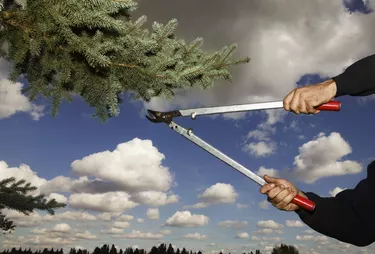
Can you deduct tools on your taxes? The rules for deducting business items changed in 2018 with the passage of the Tax Cut and Jobs Act. Depending on your situation, however, you might still be able to write off tools you buy or rent. Reviewing tools expenses/deductions and understanding the rules for claiming tools on your tax filing will help you get the maximum benefit and reduce your income tax liability.
Consider Also: Non-Employee Compensation: Definition & Compensation Reporting
Video of the Day
Video of the Day
About TJCA Changes
Until January 1, 2018, employees and the self-employed could both write off many business expenses. Employees could write off unreimbursed businesses expenses, while the self-employed could claim any expenses that were necessary to run their businesses or perform their contract or gig work.
The TJCA eliminated the deduction for employees. Only the self-employed (such as freelancers, contractors, gig workers or sole proprietors) can now claim these deductions. The law provides a few exceptions, such as members of the clergy.
Consider Also: Form 1040: What You Need to Know
Claiming Work Tools
You don't deduct tools (meaning you qualify for a tax deduction); you include them as expenses that reduce your taxable income. For example, if you make $60,000 but have $10,000 worth of business expenses, your taxable income goes down to $50,000. You don't get a deduction – those are benefits such as the mortgage interest deduction.
When you write off tools, you must first make sure they qualify. The tools must be necessary for you to perform your work, and you can only write off the portion or percentage that you use for work. For example, if you are a housepainter and buy a ladder that you only use for house painting, you can claim the entire cost of the ladder as an expense.
If you use your cell phone for work 70 percent of the time, but also use it as your personal phone 30 percent of the time, you can only expense 70 percent of the phone.
Consider Also: Self-Employed Tax Deductions, Benefits & More
Depreciating Your Tools
Depending on how much tax you're going to owe in a certain year and how much tool expenses you have, you might want to depreciate your tools, rather than claim their entire expense in one year. For example, let's say you have purchased $30,000 worth of tools, but your taxable income is going to be low enough that you won't get all or much benefit from writing off the $30,000 in tools.
You can choose to depreciate the tools, which means claiming only a portion of them each year for multiple years. You might choose to depreciate your tools by $10,000 each year for three years. Now, you'll have a $10,000 write-off you can use to reduce your taxes for the next three years.
Talk to a tax preparer – you can't depreciate equipment whenever you want and you have to set out your plans at the beginning of the depreciation period.
Use Schedule C
When you are able to claim business expenses, you will use Schedule C of your 1040 tax form. You will need to list each piece of equipment, but you won't need to provide receipts when you send in your return. You should keep receipts, however, in the event that you're ever audited.
Not only can you write off tools you purchase, but you can also claim rental tools. For example, if you do deck repair and staining work and you rent a pressure washer to clean several client decks before you fix and re-stain them, you can claim the pressure washer rental as an expense.